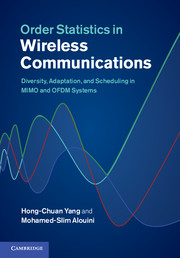 Order Statistics in Wireless Communications
Order Statistics in Wireless Communications 6 - Multiuser scheduling
Published online by Cambridge University Press: 07 October 2011
Summary
Introduction
Multiple antenna techniques can provide significant diversity benefit to wireless systems. In certain practical scenarios, however, it might be challenging to implement multiple antennas at the wireless terminals. In such a case, we can still extract the diversity bene?t by exploring the different fading channels corresponding to multiple users. Since users are separately located, different user channel will most likely experience independent fading [1, 2]. At any given time instant, it is highly probable that at least one user channel will have a favorable channel condition. The overall system performance will improve if the channel access is always granted to the users with the best instantaneous channel quality, usually the one with the highest SNR, resulting in the so-called multiuser diversity gain.
Both multiple antenna diversity and multiuser diversity try to improve the performance of wireless systems over fading channels. Their approaches, how-ever, are conceptually different. Antenna diversity targets at eliminating deep SNR fades by combining multiple diversity paths together, whereas multiuser diversity rides the SNR peaks of different users channels. As such, multiuser diversity exploits multipath fading rather than reducing it. In certain cases, fading might need to be intentionally introduced with some random beamforming approach [3]. Multiuser diversity enjoys several inherent advantages, including simpler receiver structures, as a single antenna per receiver is suffcient, and naturally independent fading channels, as users are usually geographically separated. On the other hand, multiuser diversity may require additional system resources to collect user channel state information, especially for non-reciprocal channels.
Information
- Type
- Chapter
- Information
- Order Statistics in Wireless CommunicationsDiversity, Adaptation, and Scheduling in MIMO and OFDM Systems, pp. 162 - 192Publisher: Cambridge University PressPrint publication year: 2011